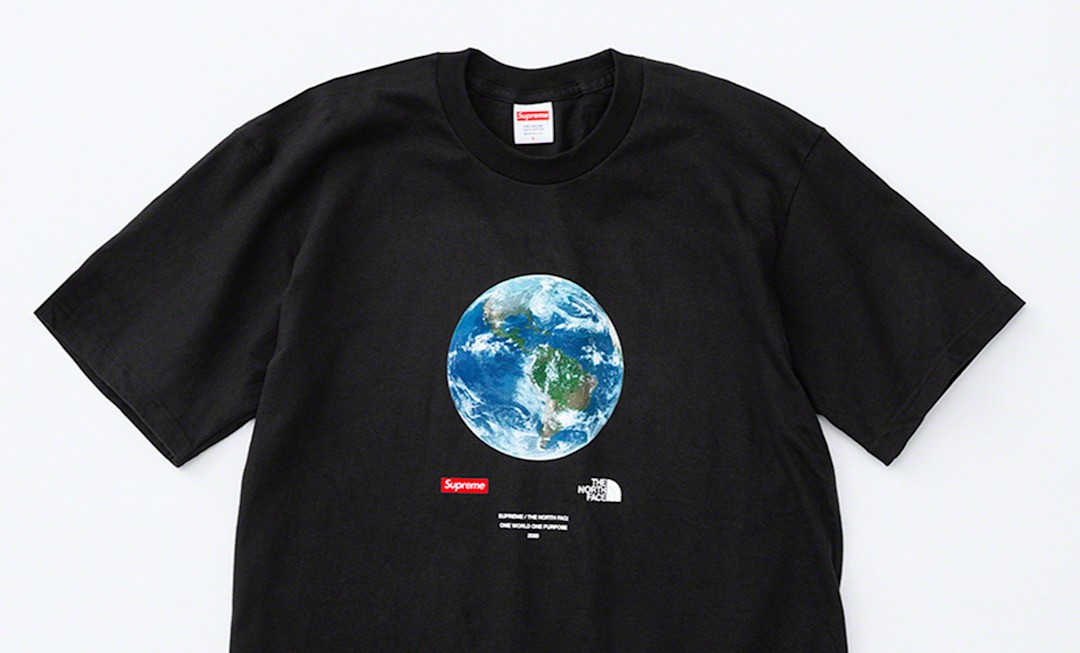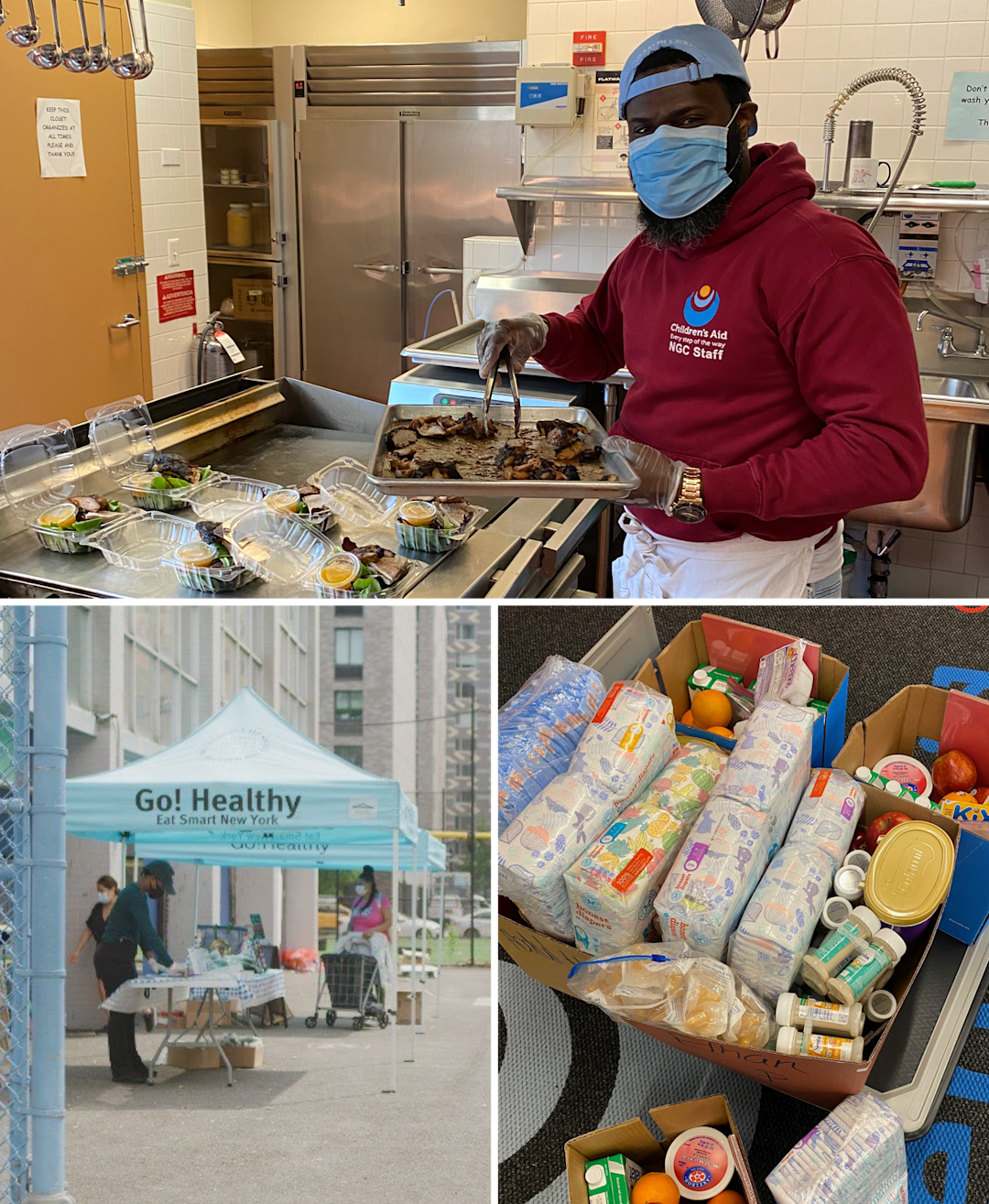
United Giving: Supreme® and GlobalGiving
2020-07-24
In late March, New York City and its suburbs quickly became an epicenter for the pandemic—accounting for roughly 5 percent of global cases of COVID-19. Witnessing the impact, especially in its most vulnerable communities, prompted us to connect with Supreme®, a 13-year collaboration partner.

The North Face and Supreme® collaborated to create the One World Tee, above, to support GlobalGiving’s Coronavirus Relief Fund.
As part of our Spring 2020 collection with Supreme®, we released a One World Tee with 100 percent of the profits supporting GlobalGiving’s Coronavirus Relief Fund. GlobalGiving connects nonprofits, donors, and companies in nearly every country around the world, and quickly delivers funds to vetted organizations that are best suited to lead recovery efforts during times of disaster.
“We first worked with GlobalGiving in 2004, and when we learned about the organization’s COVID Relief Fund, with all proceeds going to front liners and at-risk communities, we knew we could reach a large number of people,” says Mike Ferris, VP of Global Brand Management for The North Face.
The North Face’s contribution is part of our $1 million COVID-19 relief commitment through our social impact and advocacy platform, the Explore Fund benefitting New York City-based organizations including Safe Horizon and Children’s Aid. New York City’s low-income communities remain among the world’s hardest-hit groups by the COVID-19 pandemic.
The devastating effects of the pandemic are widespread, from increases in domestic violence (up 30 percent in April compared to last year) to rises in poverty which disproportionately affects children. Safe Horizon has worked tirelessly to support domestic violence survivors through the COVID-19 crisis.
“Survivors of violence tend to be the most vulnerable population during times of crisis,” says Hazel Chico, Corporate Partnerships and Engagement Manager of Safe Horizon. “We are trying to make sure that even if it’s remotely, survivors are able to access what they need to stay safe.”
Safe Horizon’s eight domestic violence shelters across the five boroughs remain open, with wrap-around services like case management, supportive counseling, housing advocacy, support groups, and other services taking place digitally. Staff work to distribute 500 meals each day to shelter residents and provide tools and resources for remote learners in shelters. With the closure of child-serving spaces like schools and daycares, children can face a greater risk of abuse. Safe Horizon’s five Child Advocacy Centers have remained open, with trauma response teams mobilizing to help the moment cases are called in.
Another Safe Horizon’s program, Streetwork Project, provides shelter, crisis support, as well as in-person meals and other critical supplies young people need to stay safe. One of Safe Horizon’s survivors, “K”, is a 25-year-old mother of two, who has been a long-term client due to housing instability as a result of generational poverty. By working with the Streetwork Project, K has received the support needed along the journey to regain custody of her child in foster care. Amid loss, isolation, and increased danger, Safe Horizon’s community of survivors, staff, and advocates are creating spaces for resilience in the face of these challenges.
Children’s Aid provides comprehensive support to children, youth, and their families in four targeted high-needs New York City neighborhoods. In response to the pandemic, the 160-year-old organization is operating health clinics in New York City to provide COVID-19 testing and treatment options, telehealth services, permanent housing to displaced youth in foster care, virtual counseling and home visits, and food boxes to hungry families (close to 40,000 food boxes so far).

Children's Aid provides support like food boxes, COVID-19 testing, and more for children and their families in high-need New York City neighborhoods.
Children’s Aid has its own food and nutrition programming that promotes healthy food choices and nutrition education. Families—many of whom live in food deserts within the city—contribute $10 and receive a $30 bag of produce to their home or a nearby center. One family, who was living in a shelter after the mother lost her job, found help through a Children’s Aid social worker. The Children’s Aid social worker ensured the family had access to all the resources they needed, including daily access to nutritious meals.
“Partner support has been instrumental through this crisis,” says DeMeo. It’s given us the ability to continue to serve in communities and be experts in the field and frontline responders with as little disruption to families as possible. It allows us to continue to be their advocates by offering programs, a level of health care, food security and social emotional support.”
Through One World Tee sales, The North Face and Supreme® have raised over $600,000 to provide resources to communities, both on the ground in New York and through Global grantee funds, to protect those impacted most by the pandemic.